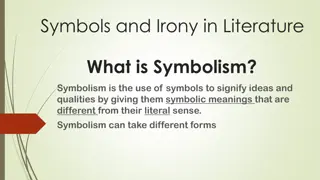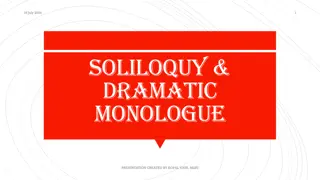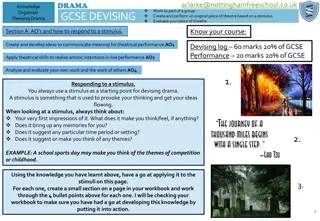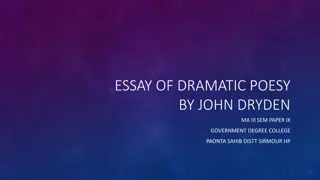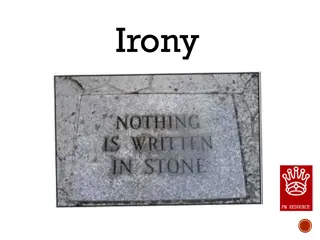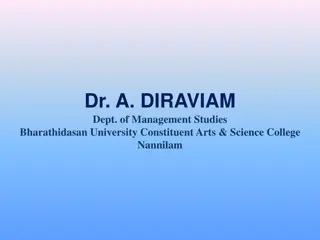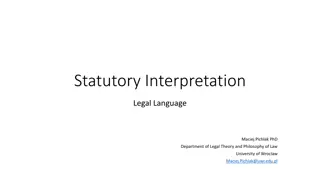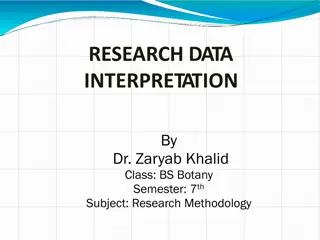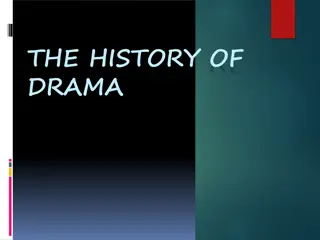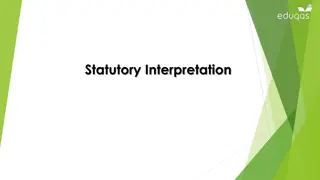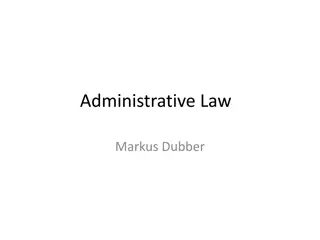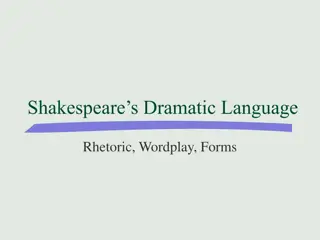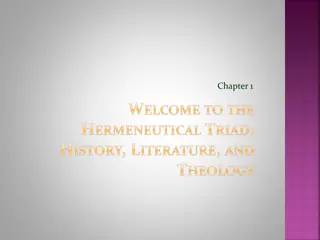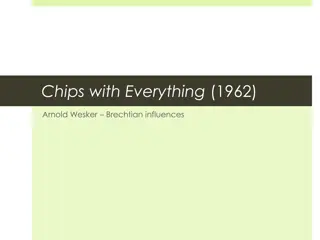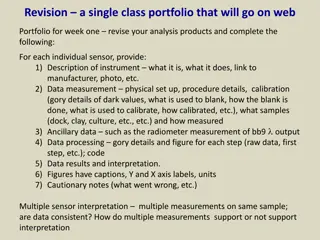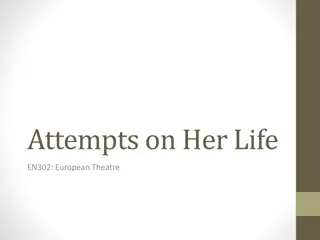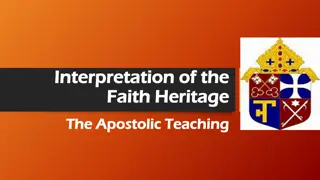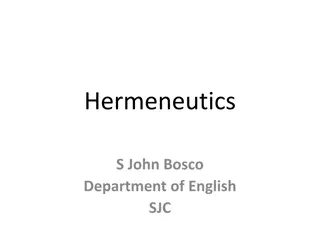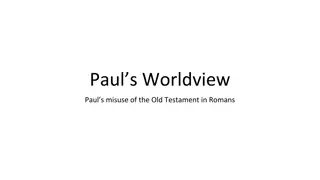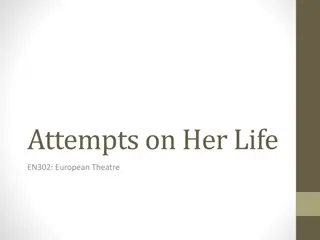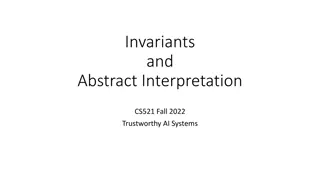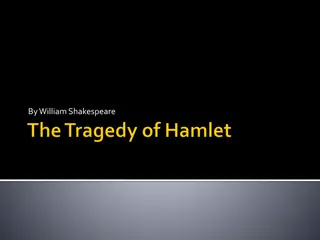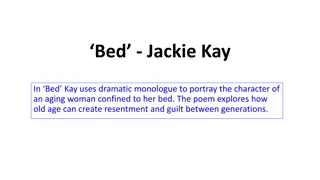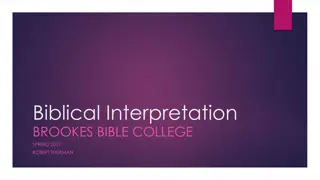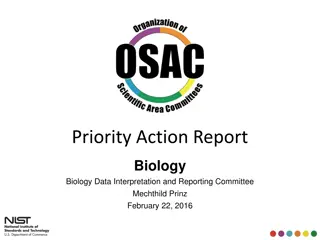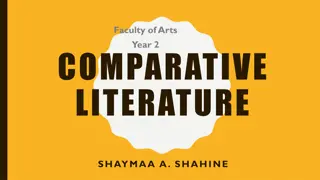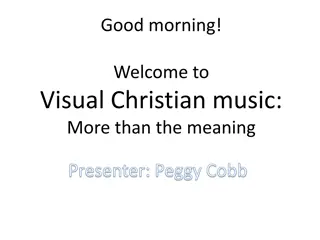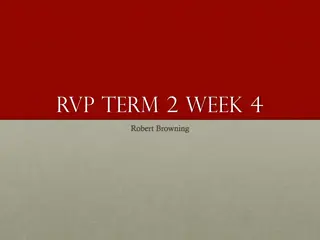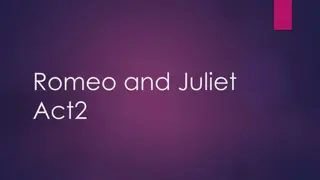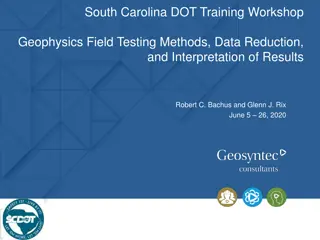Interpretation
Interpretation in research methodology involves drawing inferences from collected data, establishing continuity in research, and developing explanatory concepts for future studies. It helps researchers understand abstract principles, make predictions, and maintain research continuity. Interpretation
2 views • 5 slides
Understanding Symbolism and Irony in Literature
Symbolism in literature involves using symbols to convey deeper meanings beyond the literal sense, adding layers of interpretation for readers. Common symbols like doves, red roses, and sunrises represent peace, love, and new beginnings, respectively. Irony, on the other hand, includes situational,
0 views • 6 slides
Understanding Soliloquy and Dramatic Monologue in Literature
A soliloquy is a form of monologue where a character speaks to themselves, the audience, or a surrogate, revealing inner thoughts. This presentation explores different types of soliloquies and their significance in literary works, including examples from Shakespeare's Hamlet. Additionally, it delves
0 views • 9 slides
Devising Drama - GCSE Knowledge Organiser
This GCSE Drama Knowledge Organiser provides guidance on devising and performing an original piece of theatre based on a stimulus. It covers how to respond to stimuli, develop ideas for theatrical performances, apply theatrical skills, analyze and evaluate work, and rehearse and refine the devised p
0 views • 10 slides
Debate on Dramatic Poesy by John Dryden
John Dryden's work "Essay of Dramatic Poesy" is a dialogue among four speakers that debates the merit of classical versus modern drama, the comparison between French and English drama, and the use of rhyme in plays. Each speaker presents arguments showcasing their perspectives on these topics, revea
0 views • 5 slides
Understanding Potential Uplift Interpretation in ERCOT Protocols
ERCOT's Potential Uplift Interpretation Protocol defines Potential Uplift as the potential uplift to the Counter-Party based on short payments. The protocol outlines calculations and clarifies language ambiguity to ensure accurate interpretation. ERCOT seeks market feedback for further clarification
0 views • 6 slides
Understanding Irony in Verbal, Dramatic, and Situational Contexts
Explore the nuances of verbal, dramatic, and situational irony through examples and explanations. Verbal irony involves saying something different from what is meant, often using humor like puns. Dramatic irony occurs when the audience knows something the characters don't, creating suspense. Situati
0 views • 12 slides
Understanding Research Interpretation and Report Writing in Management Studies
Interpretation in research involves drawing inferences from collected facts to find broader meanings of findings. Techniques such as generalization, concept formulation, and consulting experts help ensure correct interpretation. Writing research reports is a crucial component, requiring logical anal
0 views • 25 slides
Understanding Statutory Interpretation in Legal Context
Explore the intricacies of statutory interpretation, linguistic and non-linguistic methods, and types of interpretation in legal contexts. Uncover the significance of legal reasoning, historical perspectives, and comparisons between Anglo-Saxon and Continental legal cultures. Delve into the complexi
1 views • 17 slides
Research Data Interpretation
Principles and methods of data interpretation in research, transitioning from data to knowledge through analysis and inference. Importance of proper interpretation for drawing accurate conclusions and enhancing the value of research findings.
0 views • 33 slides
The Art of Dramatic Writing: Exploring Character Development and Dialectical Approach
Every object and human has multiple dimensions that influence character development in dramatic writing. Understanding the physiological, sociological, and psychological aspects, along with the impact of the environment and dialectical approach, shapes characters' growth and decisions in storytellin
0 views • 12 slides
Advanced Methods of Interpretation: Hermeneutics and Structuralism Lecture at Masaryk University
Understanding interpretation in cultural sociology through hermeneutics and structuralism is explored in Lecture III by Dr. Werner Binder at Masaryk University. The lecture delves into the art of interpretation, focusing on classical hermeneutics, Friedrich Schleiermacher's romantic hermeneutics, an
1 views • 37 slides
Exploration of Various Poetry Forms: Descriptive, Narrative, Dramatic, and Metaphysical
Poetry is a diverse art form encompassing descriptive portrayal, storytelling narratives, engaging dialogues, and profound metaphysical insights. Descriptive poetry vividly captures objects and scenes like paintings, narrative poetry weaves interconnected stories, dramatic poetry involves dialogues,
0 views • 11 slides
The Evolution of Drama: A Historical Journey
Drama, originating from ancient Greece, has evolved through the centuries from being a genre of poetry to a distinct theatrical form encompassing tragedy, comedy, and more. The masks of Thalia and Melpomene symbolize the essence of comedy and tragedy, while the Great Dionysia festival in Athens hono
0 views • 41 slides
Understanding Statutory Interpretation: Rules, Approaches, and Challenges
Explore the concept of statutory interpretation, including the intention of Parliament, problems that can arise, various rules and approaches used in interpretation, aids and presumptions, criticisms, and the relationship between statutory interpretation, EU law, and precedent. The Literal Rule, a c
2 views • 26 slides
Understanding Dramatic Monologue in Poetry through "Havisham
Dramatic monologue in poetry is a form where a solitary speaker addresses an audience, offering insight into a character's thoughts and emotions. This exploration often reveals complexities, conflicting viewpoints, and hidden truths. Through examining the character of Miss Havisham from Charles Dick
1 views • 43 slides
Understanding Three Approaches to Statutory Interpretation in Administrative Law
Explore the concepts of Ordinary Meaning, Context, and Three Approaches to Statutory Interpretation in Administrative Law through insightful discussions and relevant examples. Gain a deeper understanding of legal interpretation principles and their application in legal frameworks.
1 views • 14 slides
Exploring Shakespeare's Dramatic Language and Themes
Shakespeare's dramatic language entails rhetoric, wordplay, and rich forms that offer both pleasure and challenges to readers. His verse showcases density and richness, with characters expressing thoughts through powerful metaphors and figurative language. Examples from "Macbeth" illustrate how imag
0 views • 40 slides
Results of 17th Annual Eagle Invitational Speech Tournament
The 17th Annual Eagle Invitational Speech Tournament took place online on January 30, 2021. The event included various categories like Creative Expression, Discussion, Dramatic Interpretation, and Duo Interpretation. Winners were recognized in each category, with participants showcasing their talent
0 views • 17 slides
Exploring Biblical Interpretation: History, Literature, and Theology
Delve into the importance of skilled biblical interpretation, the cost of failed interpretation, and the essential characteristics of a biblical interpreter. Understand the significance of humility, the role of the Spirit, and the need for accuracy in handling the Word of God. Learn about the hermen
0 views • 23 slides
Understanding Irony: Verbal, Dramatic, and Situational Examples
Dive into the world of irony with examples of verbal, dramatic, and situational irony explained through scenarios like sarcastic comments, horror movie twists, and unexpected encounters. Explore how irony adds layers of meaning and depth to storytelling, from characters knowing more than others to o
0 views • 10 slides
Epic Theatre and Brechtian Influences in Modern Drama
Epic theatre, influenced by Bertolt Brecht, challenges traditional Aristotelian and Hegelian dramatic structures by emphasizing critical engagement and distancing strategies. It uses historical narratives and didactic elements to provoke social consciousness and active spectator participation, contr
0 views • 26 slides
Comprehensive Sensor Portfolio Analysis for Data Interpretation
This portfolio revision focuses on providing detailed descriptions and analysis of individual sensors for data collection and interpretation. It includes information on instrument specifications, data measurement setups, ancillary data, data processing steps, results interpretation, and cautionary n
0 views • 5 slides
Exploring European Theatre Traditions
European theatre traditions, as discussed through Lehmann's Postdramatic Theatre and Aristotle's dramatic elements, highlight the unique characteristics that differentiate them from non-European traditions. Concepts such as hamartia, anagnorisis, and mimesis are explored along with the rejection of
0 views • 30 slides
Understanding the Role of Dogmas and Interpretation in Faith Heritage
The interpretation of faith heritage, apostolic teaching, and the role of dogmas in the Church form a foundation of belief that guides the spiritual journey. An authentic interpretation of God's Word is entrusted to the teaching office of the Church, emphasizing the connection between divine truths,
0 views • 9 slides
Understanding Hermeneutics: Exploring Interpretation and Meaning
Hermeneutics, a vital part of theology and philosophy, delves into understanding text and interpretation. Influenced by prominent thinkers like Heidegger and Ricoeur, it emphasizes the historical encounter and personal experience within the world. The concept of hermeneutical circle and the two area
0 views • 24 slides
The Interpretation of Messiah in Paul's Worldview
Paul's interpretation of the Old Testament in Romans is discussed regarding the portrayal of Jesus as Messiah. Scholars debate the alignment between the OT and NT perspectives on Messiah, exploring hermeneutics and biblical interpretation methods. The significance of understanding the Hebrew Bible's
0 views • 27 slides
European Theatre: Exploring Dramatic Elements and Themes
European theatre has a rich history and tradition that distinguishes it from other global theatre practices. From Aristotle's dramatic elements to the conflicts faced by characters like Antigone and Creon, this form of theater delves into themes of recognition, imitation, and conflict. Hans-Thies Le
0 views • 35 slides
Understanding Invariants and Abstract Interpretation in Trustworthy AI Systems
Invariants and Abstract Interpretation are crucial concepts in building trustworthy AI systems. This involves defining configurations, concrete semantics, set semantics, and handling programs with loops. Monotonic functions play a vital role in ensuring consistency in the interpretation of these sys
0 views • 22 slides
Shakespearean Dramatic Techniques Analysis
Explore the intricate use of monologues, soliloquies, structural divisions, and emotional responses in William Shakespeare's plays. Delve into the dialogues between characters like Hamlet, Gertrude, and Claudius to uncover themes of love, madness, and expectation. Discover how Shakespeare utilizes d
0 views • 23 slides
Analysis of "Bed" by Jackie Kay: Themes, Form, and Use of Scots
Bed" by Jackie Kay is a dramatic monologue portraying the perspective of an elderly woman confined to her bed, exploring themes of aging, resentment, and guilt between generations. The poem uses Scots to add immediacy to the narrative, highlighting the woman's reliance on her daughter and contemplat
1 views • 34 slides
Importance of Proper Hermeneutics in Biblical Interpretation
Hermeneutics, the science of biblical interpretation, is crucial in understanding and applying the Word of God accurately. It involves rules and methods to determine the intended meaning of the text. Proper hermeneutics ensures correct belief, application, and interpretation of the Bible while avoid
0 views • 170 slides
Forensic Biology Data Interpretation Committee Overview
The Biological Data Interpretation and Reporting Committee focuses on establishing best practices, guidelines, and standards for forensic DNA laboratory interpretation. Their goal is to ensure quality and consistency in the forensic community by standardizing scientifically valid methods of interpre
0 views • 26 slides
Exploring Character Creation and Dramatic Conventions in Drama Class
Using a short piece of text as a stimulus, students in a drama class dive into creating characters and exploring dramatic conventions to craft scenes depicting different aspects of their characters' lives. The story unfolds in Hell's Alley, where tension and conflict shape the protagonist's experien
0 views • 10 slides
Exploring Dramatic Forms: From Burlesque to Well-Made Plays
Dive into the world of dramatic forms, where Burlesque emerged in Medieval Drama and was revived in the Seventeenth Century to satirize serious works. Learn about high burlesque that parodies literary works like Alexander Pope's "The Rape of the Lock" and low burlesque that mocks serious subjects. D
0 views • 9 slides
Workshop on Visual Christian Music Interpretation with Peggy Cobb
This workshop delves into the art of interpreting music visually, focusing on incorporating styles, rhythms, and presentation elements to convey the essence of a song in American Sign Language. Participants will explore modern and hymnal Christian music genres, alongside pop and country songs, to en
0 views • 15 slides
Analysis of Robert Browning's Dramatic Monologues and Implied Audience
In this content, we delve into the elements found in the dramatic monologues of Robert Browning, focusing on implied addressees, ideal recipients, and the implications of the dramatic form on the relationship between speaker, addressee, and reader. We explore how the presence of an implied audience
0 views • 5 slides
Analysis of Literary Devices in Romeo and Juliet Act 2
In Act 2 of Romeo and Juliet, the characters use various literary devices such as allusion, dramatic irony, hyperbole, and foreshadowing. Mercutio mistakenly believes Romeo is still in love with Rosaline, showcasing dramatic irony. Additionally, Friar Lawrence's words foreshadow the danger in Romeo
0 views • 10 slides
Understanding Irony: Types, Purpose, and Examples
Irony is about expectations and contrast between reality and what is being said. It can add interest, depth, suspense, and humor to texts. The three types of irony are verbal, dramatic, and situational, each serving a unique purpose to engage the audience. Examples from popular stories like Beauty a
0 views • 12 slides
Geophysics Field Testing Workshop: Methods and Interpretation
South Carolina DOT Training Workshop on geophysics field testing methods, data reduction, and interpretation of results by Robert C. Bachus and Glenn J. Rix. The workshop covers suspension logging, borehole geophysical logging, geotechnical testing, and geophysical service companies such as Schlumbe
0 views • 11 slides

